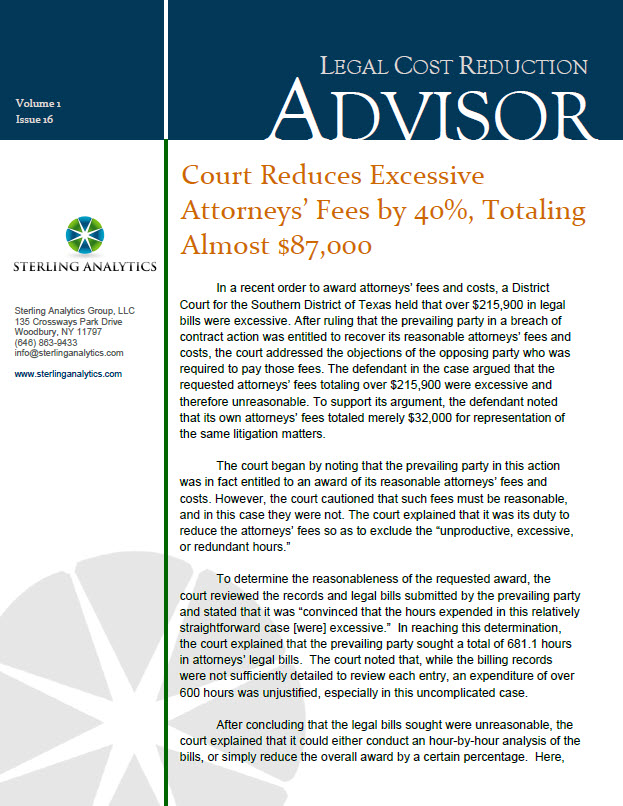In a recent order to award attorneys’ fees and costs, a District Court for the Southern District of Texas held that over $215,900 in legal bills were excessive. After ruling that the prevailing party in a breach of contract action was entitled to recover its reasonable attorneys’ fees and costs, the court addressed the objections of the opposing party who was required to pay those fees. The defendant in the case argued that the requested attorneys’ fees totaling over $215,900 were excessive and therefore unreasonable. To support its argument, the defendant noted that its own attorneys’ fees totaled merely $32,000 for representation of the same litigation matters.
The court began by noting that the prevailing party in this action was in fact entitled to an award of its reasonable attorneys’ fees and costs. However, the court cautioned that such fees must be reasonable, and in this case they were not. The court explained that it was its duty to reduce the attorneys’ fees so as to exclude the “unproductive, excessive, or redundant hours.”
To determine the reasonableness of the requested award, the court reviewed the records and legal bills submitted by the prevailing party and stated that it was “convinced that the hours expended in this relatively straightforward case [were] excessive.” In reaching this determination, the court explained that the prevailing party sought a total of 681.1 hours in attorneys’ legal bills. The court noted that, while the billing records were not sufficiently detailed to review each entry, an expenditure of over 600 hours was unjustified, especially in this uncomplicated case.
After concluding that the legal bills sought were unreasonable, the court explained that it could either conduct an hour-by-hour analysis of the bills, or simply reduce the overall award by a certain percentage. Here, the legal bills were not sufficiently detailed to allow for an individual item analysis and so the court implemented an overall reduction of 40%. This reduced the attorneys’ fee award by $86,390.
Implications for Legal Billing: While this case does not provide many specific rules for attorney billing, it does stand for the principle that excessive legal fees are impermissible. In this case, almost $87,000 of the attorneys’ fee request was deemed to be unreasonable, a significant savings to any consumer of legal services. As a client, it is particularly difficult to determine whether your attorneys are excessively billing you for their time. However, the court noted here that the submitted legal bills were not sufficiently detailed to analyze each individual task. This is preventable, as you may require your attorneys to provide you with a detailed and contemporaneous account of the tasks performed. A more delineated record of your representation allows you to analyze each item, and better determine whether the time spent and the task performed were reasonable, or if they were excessive. By performing this review and analysis of your legal bills, you have the potential to reduce your costs significantly.
* Compass Bank v. 288/59 GP LLC, 2011 WL 739341 (S.D. Tex. 2011). Full copies of court decisions may be available through counsel or through various Internet links or paid services.
By Lauren Stulmaker


